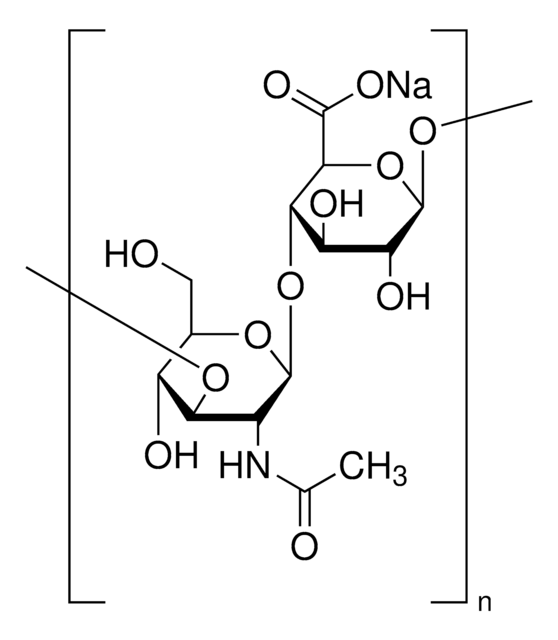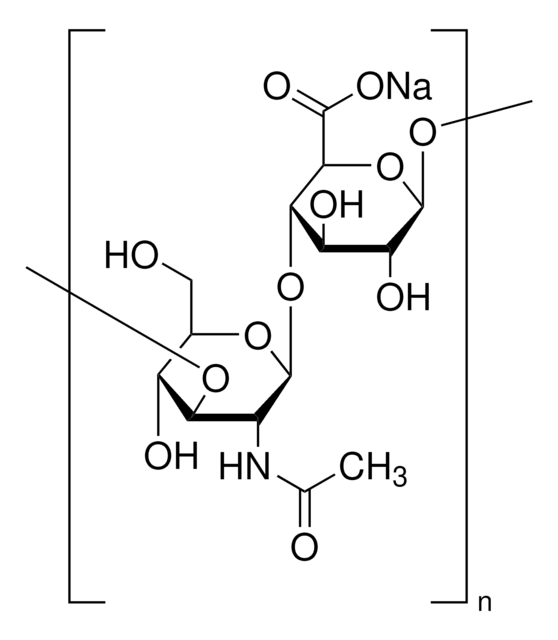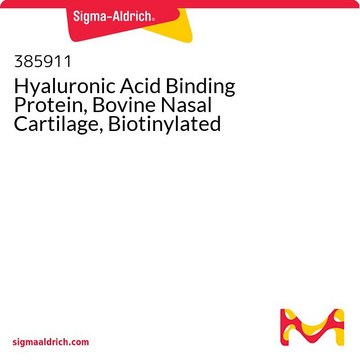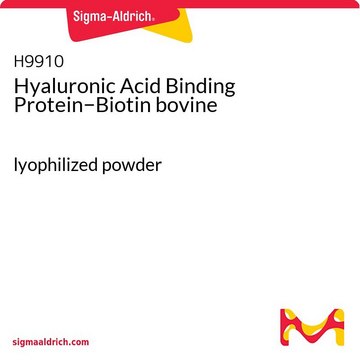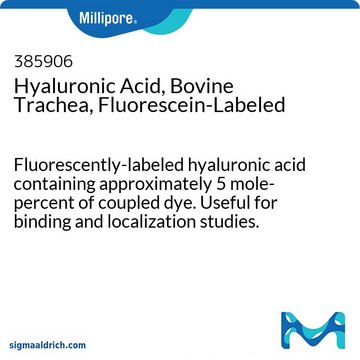Wszystkie zdjęcia(1)
Key Documents
B1557
Hyaluronan biotin sodium salt
≥97%, soluble powder
Synonim(y):
Hyaluronic acid biotin
Zaloguj sięWyświetlanie cen organizacyjnych i kontraktowych
About This Item
Polecane produkty
Poziom jakości
Próba
≥97%
Postać
soluble powder
masa cząsteczkowa
≥700 kDa
strata
≤5% loss on drying
kolor
white to tan
temp. przechowywania
2-8°C
Zastosowanie
Hyaluronan biotin (HA-biotin) may be used as a specific bioaffinity probe to detect HA-binding proteins (hyaladherins), HA-receptors and HA-binding components in tissues and cells. Hyaluronan biotin may be used in the development of affinity binding systems for the immobilization and purification of hyaladherins. HA-biotin may be used in hydrogel development and for drug targeting.
Highly sensitive probe for detecting nanogram levels of hyaluronan binding proteins (hyaladherins).
Inne uwagi
From cocks comb or fermentation.
This page may contain text that has been machine translated.
Kod klasy składowania
11 - Combustible Solids
Klasa zagrożenia wodnego (WGK)
WGK 3
Temperatura zapłonu (°F)
Not applicable
Temperatura zapłonu (°C)
Not applicable
Środki ochrony indywidualnej
Eyeshields, Gloves, type N95 (US)
Certyfikaty analizy (CoA)
Poszukaj Certyfikaty analizy (CoA), wpisując numer partii/serii produktów. Numery serii i partii można znaleźć na etykiecie produktu po słowach „seria” lub „partia”.
Masz już ten produkt?
Dokumenty związane z niedawno zakupionymi produktami zostały zamieszczone w Bibliotece dokumentów.
Klienci oglądali również te produkty
P Auvinen et al.
The American journal of pathology, 156(2), 529-536 (2000-02-10)
Hyaluronan (HA) is an extracellular matrix polysaccharide that promotes cell migration through its cell surface receptors and by effecting changes in the physical environment. HA expression is frequently increased in malignant tumors, whereas its association with the invasive potential and
T Pouyani et al.
Bioconjugate chemistry, 5(4), 370-372 (1994-07-01)
Hyaluronic acid (HA) is a linear polysaccharide composed of repeating disaccharide units of D-glucuronic acid (GlcUA) and N-acetyl-D-glucosamine (GlcNAc). Hyaluronate plays an important role in many biological processes as mediated by its interactions with a number of HA-binding proteins (the
D Liu et al.
Frontiers in bioscience : a journal and virtual library, 3, d631-d636 (1998-06-23)
CD44 is a cell surface glycoprotein present on many cell types. Many CD44 isoforms have been identified. All CD44 isoforms utilize identical transmembrane and cytoplasmic domains. The hematopoietic form of CD44 (CD44H) is the major CD44 protein present on normal
James Melrose et al.
Methods in molecular medicine, 101, 65-78 (2004-08-10)
Hyaluronan (HA) binding proteins (HABPs) were localized in cartilaginous ovine tissues (articular cartilage, intervertebral disc) using a biotinylated HA (bHA) oligosaccharide bioaffinity probe. The bHA oligosaccharide probe was prepared by partial digestion of HA with ovine testicular hyaluronidase, and the
Yuan Cui et al.
Applied biochemistry and biotechnology, 169(1), 239-249 (2012-11-28)
Hyaluronic acid is a naturally ionic polysaccharide with cancer cell selectivity. It is an ideal candidate material for delivery of anticancer agents. In this study, hyaluronic acid (HA) micro-hydrogel loaded with anticancer drugs was prepared by the biotin-avidin system approach.
Produkty
Glycosaminoglycans are large linear polysaccharides constructed of repeating disaccharide units.
Nasz zespół naukowców ma doświadczenie we wszystkich obszarach badań, w tym w naukach przyrodniczych, materiałoznawstwie, syntezie chemicznej, chromatografii, analityce i wielu innych dziedzinach.
Skontaktuj się z zespołem ds. pomocy technicznej
